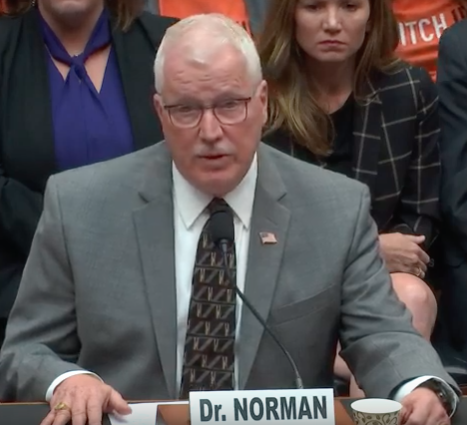WASHINGTON — It’s vaping week on capitol hill. House Committee on Oversight and Reform heard from officials at the CDC Tuesday.

On Wednesday, Kansas Department of Health and Environment Secretary Dr. Lee Norman addressed the subcommittee in Washington. The hearing “Sounding the Alarm: The Public Health Threats of E-Cigarettes.” Kansas has had two confirmed deaths related to vaping.
Watch his testimony and the full hearing .
Read Norman’s Testimony here:
Chair DeGette, Ranking Member Guthrie, and distinguished subcommittee members thank you for the opportunity to appear before the House Energy and Commerce Oversight and Investigations Subcommittee today to discuss the need to the public health emergency regarding e-cigarettes, or as the industry has termed it, vaping.
We greatly appreciate your attention to this issue of critical importance to the health of the population. As the State Health Officer of Kansas, a US Army Lieutenant Colonel and the State Surgeon of Kansas, and as a recently-deployed 35th Infantry theater medical commander in the Middle East, I have personally witnessed the deleterious impact addiction to any substance, whether it be nicotine, alcohol or illicit substances has on the citizens of Kansas and the economic costs to our entire health care system. I am now witnessing an outbreak of lung diseases impacting our state and recently claim the life of one Kansan. Our youth were poised to be the generation that ended smoking.
That legacy is now in jeopardy. Youth usage of e-cigarettes, along with outbreak of lung diseases that continue to be investigated, is alarming. As a physician, public servant, military serviceman, father and grandfather,
I owe it to the troops I work with, the staff I support and the Kansans I serve, to do what I can to win this battle for our youth. In Kansas, we currently have eight probable/confirmed vaping related cases with one of those being a death. Of the cases, four are male and four are female and range in age from 17-57 years old. All were hospitalized, five have been released from the hospital and two remain hospitalized. Regarding the types of vaping products used, three of the patients reported using only nicotine, two reported only THC, one reported using CBD, and two reported using both THC and nicotine.
According to the Centers for Disease Control and Prevention (CDC) e-cigarettes typically contain nicotine, most also contain flavorings and other chemicals, and some may contain marijuana or other substances. They are known by many different names and come in many shapes, sizes and device types. E-cigarettes can contain harmful or potentially harmful substances, including nicotine, heavy metals (e.g., lead), volatile organic compounds, and cancer-causing chemicals.
Additionally, some e-cigarette products are used to deliver illicit substances; may be acquired from unknown or unauthorized (i.e., “street”) sources; and may be modified for uses that could increase their potential for harm to the user.
Youth, young adults, pregnant women, as well as adults who do not currently use tobacco products should not use e-cigarettes. E-cigarettes containing nicotine have the potential to help some individual adult smokers reduce their use of and transition away from cigarettes.
However, e-cigarettes are not currently approved by the Food and Drug Administration (FDA) as a quit smoking aid, and the available science is inconclusive on whether e-cigarettes are effective for quitting smoking.1 E-cigarettes are the most commonly used tobacco product among youth.
Forty-four percent of Kansas high school youth who use e-cigarettes also currently use conventional cigarettes. Nationally, 96.1 percent of youth who initiated e-cigarette use between 2016 and 2017 did so with a flavored e-cigarette product. Preliminary findings from the 2019 National Youth Tobacco Survey (NYTS) were reported. They found over one quarter of U.S. high school students report using an e-cigarette product in the past 30 days, an increase from 2018 when the rate of past 30-day use was 20.8 percent. Most teens who are vaping never smoked cigarettes.
Vaping is how they are initiating inhaling substances into their lungs. In Kansas, the top reasons why youth report using e-cigarettes include: a friend or family member uses, its availability in different flavors; and they perceive it as being less harmful than other forms of tobacco. We must work diligently to stop youth from acquiring and using e-cigarettes or vaping devices.
States are taking a leading role in implementing strong action to protect consumers from the harms of ecigarette product use. New York has also banned most flavored vaping products but will allow mint and menthol flavorings to remain on the shelves. California announced a crackdown on illegal and counterfeit vaping products and allocated funds into a public awareness campaign on vaping harms. Kansas is committed to combating the issue.
We are actively reviewing policy options to address this epidemic, which includes options to ban of flavored e-cigarette products through executive action or passing of legislation as the federal government moves ahead with its own regulatory plan. To increase education regarding e-cigarettes and what the tobacco industry has termed as “vaping,”
KDHE and the Kansas Department of Education partnered to develop a Vape-Free Schools kit. Schools are urged to adopt the kit and parents and caretakers are encouraged to have conversations with their children. I recognize this to be a public health emergency of considerable importance. As Chief Medical Officer of large health systems for over 25 years,
I have served as incident commander for H1N1 pandemic influenza, Ebola, the ongoing opioid epidemic, and now this. We are currently losing the battle against e-cigarettes and vaping, and we do not even understand the cause. We need a diligent and consistent approach to solving this, including thoughtful policy-making and regulatory changes, in the name of consumer protection and the public’s health. I am happy to participate in the effort.
